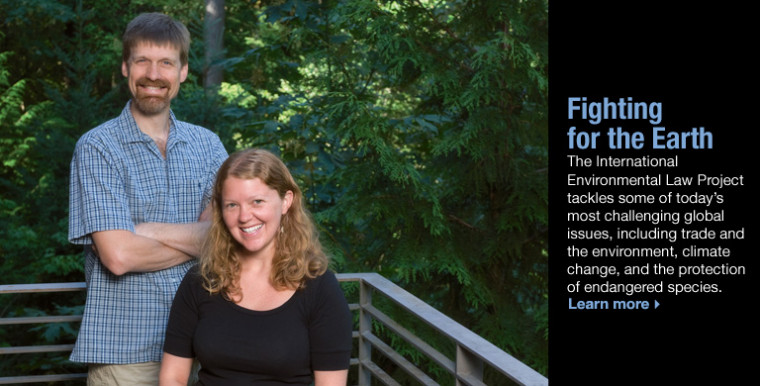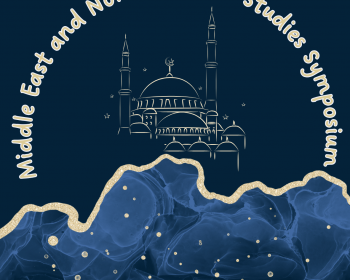IELP: Fighting for the Earth
Open gallery

The International Environmental Law Project tackles some of today’s most challenging global issues, including trade and the environment, climate change, and the protection of endangered species.
By Bobbie Hasselbring
Wildlife photography by Tom and Pat Leeson
As buzzards circle overhead, two dozen elephant carcasses rot in the hot African sun. Each immense beast–some weighing as much as five tons–has one or more wounds oozing blood from the AK-47 that felled it. But it’s the faces that are hard to forget. Poachers have hacked them off to harvest the huge ivory tusks. Six thousand miles away, in Singapore, customs officials operating on an anonymous tip open a shipping container from Malawi. Inside, stacked like cordwood, are 500 gleaming elephant tusks, their ends stained brown with dried blood. Next to them, packed carefully in boxes, are more than 40,000 intricately carved hankos, ivory seals used to notarize documents in Japan. The contraband shipment is worth more than $10 million. The world’s illegal animal trade results in multibillion-dollar profits, often to those involved in other transnational crimes such as drug trafficking and arms trading. It also wreaks havoc with fragile ecosystems. What do participants in the law school’s International Environmental Law Project (IELP) think they can do about it? Plenty.
“When you look at global environmental problems, it’s easy to say these challenges are insurmountable,” says Chris Wold JD ‘90, IELP’s director. “But they’re not. You just have to be creative and fearless.”
Wold should know. He’s been at the forefront of creating international environmental law and fighting for sound environmental practices on a global scale for nearly two decades. Under his guidance, IELP has grown into one of the most respected international environmental law entities in the world.
Lewis & Clark’s IELP is the only campus-based, faculty-led international environmental law clinic in the nation. Participants develop, implement, and reinforce international environmental law by working directly with governments, international institutions, and nongovernmental organizations.
“IELP provides an avenue for our students to truly experience international environmental law,” says Janice Weis, associate dean of environmental and natural resources law at the law school. “Students tackle issues like how treaties affect environmental law and how countries can work together to solve global environmental problems. They actually get to travel internationally and negotiate treaties and documents. It’s a pretty incredible experience for them.”
Humble Beginnings, Global Impacts
Wold, IELP’s director, is a trailblazer in international environmental law. He discovered his passion as a student at Lewis & Clark Law School in the late 1980s. “I was fascinated by how little law was being applied to international conventions,” he recalls. “I also thought there might be more room for citizen involvement in international environmental law, much like there is in domestic environmental law.”
In 1990, Wold convinced the director of the newly formed Center for International Environmental Law, in Washington, D.C., to let him do an externship there. The experience led to a position as a staff attorney and cemented his commitment to the field. “Right off the bat, I was traveling to newly emerging democracies and attending international meetings,” he says. “Then in 1992, the United Nations Conference on the Environment took place in Rio de Janeiro, and international environmental law really took off.”
In 1994, Wold returned to Lewis & Clark as an adjunct professor, and founded IELP. The clinic typically attracts 5 to 10 law students each semester. Students attend a class once a week and then spend a minimum of eight hours a week on projects like drafting treaty language, writing white papers, and creating petitions for government or global organizations.
Unlike domestic environmental law, international environmental law often has few or no legal precedents. That means that international environmental attorneys and student attorneys actually get to create law, something that rarely happens in domestic environmental law.
Erica Thorson JD ‘05, clinical professor and IELP staff attorney, says, “Whether it’s drafting a treaty itself or the rules that govern the implementation of a treaty, we get the first shot at drafting what we think the law should be.”
An early IELP success in creating new international environmental law involved drafting a turtle conservation treaty between Panama, Nicaragua, and Costa Rica. Wold and his students not only had to ensure the treaty made sense legally, but they also worked with turtle biologists to make certain the laws would work for the turtles they were trying to protect. Today, Panama and Costa Rica are implementing IELP’s convention.
Of course, there are always more projects than time or money will allow. Director Wold says he chooses the projects IELP will take on based on whether they will provide a good learning experience for the students and will help enforce, implement, or develop international environmental law. Also, since IELP is largely self-funded, he considers whether clients can fund the work.
Different Skill Sets
International environmental lawyers can’t rely on litigation to resolve issues. Citizens and citizen groups have no legal standing with international panels like the World Court. Instead, IELP works through networking, negotiating, and relationship building.
“Our work is more campaign-driven than litigation-driven,” says Thorson. “IELP works on advancing international environmental law–raising awareness and creating new law. If a party is not in compliance, there’s usually a reason. For instance, developing countries often lack the financial resources or technical capacity to comply with regulations. So we work on how we can get them what they need so they can comply. We strive to use carrots rather than sticks to achieve our objectives.”
Wold agrees. “In domestic environmental law, you’ve got clients who want to stop a timber sale or stop someone from using chemicals that are hazardous to our health, and you sue the offender. In international environmental law, you can’t sue anybody as an attorney representing nongovernmental organizations. Instead, you submit a petition or documents through convention processes to see if you can get governments to approve certain outcomes.”
The process is challenging and time-consuming. “We aren’t the decision makers, which can be frustrating,” admits Wold. “We can come up with all these great ideas, but we still need a government to move the proposal forward. Over time, you develop contacts within the relevant agencies. You keep calling and pushing and, hopefully, your idea gravitates up the chain of command until someone is willing to support your proposal.”
For Wold, that means fostering a reputation for IELP as an unbiased legal advocacy group. “If you work in the conservation field,” he says, “many governments lump you into the animal welfare activist category, and then it’s impossible to push forward any proposal. We’ve worked hard to carve out a reputation for IELP as an unbiased legal advisor.”
That kind of respected reputation is crucial in earning support and agreement in meetings with officials from as many as 170 governments, each representing people from varying cultures and economic backgrounds. “You have to be able to convince governments that your ideas are right,” Wold says. “You need to be able to walk up to a delegate from Brazil and say, ‘I’m going to talk with you for two minutes about my proposal,’ even if he or she doesn’t want to talk with you. Then you need to talk with the person from Ghana, then the person from China, and so on. To round up the votes you need, you have to be persistent.”
Real-World Experience
For students, the international experience that IELP provides can be empowering and even life-changing. In 2001, the International Whaling Commission (IWC) was considering rules for the resumption of commercial whaling and asked IELP to conduct a comparative analysis of how countries around the world regulated fisheries.
Lockey White JD ‘01 traveled to London as Wold’s assistant at the IWC. Outside, more than a thousand activists, many in whale costumes, shouted and carried signs with messages like “Save the whales” and “Whale meat equals murder.” Inside, delegates from 85 countries, all wearing simulcast translators, grappled with the meeting’s hot-button issue: Japan’s all-out effort to overturn the ban on commercial whaling. The atmosphere was tense and the stakes were high. Rumors flew about secret, behind-the-scenes deals to get countries to support the resumption of commercial whaling.
White was in her element. “Observing firsthand the horse-trading, haggling, and outright intimidation that takes place as delegations struggle for consensus and compromise was fascinating,” she recalls. Thanks in part to IELP’s legal analysis and sound recommendations, Japan’s power play failed and the whales were spared. “I learned that nothing in international environmental law is certain,” White says, “it is an exciting, cutting-edge area of law that changes every day.”
In 2004, Deborah Scott JD ‘05 traveled to Bangkok to participate in the Convention on International Trade in Endangered Species of Wild Fauna and Flora. More than 2,000 delegates from countries and organizations all over the world crowded into the convention hall. The air conditioning strained to keep the legendary Thai heat and humidity under control as attendees confronted issues ranging from trade in elephant ivory to listing the great white shark as an endangered species.
The students from IELP were relegated to the back of the hall, an area reserved for nongovernmental organizations like Greenpeace and the Whale and Dolphin Conservation Society. Although they were tired from flying more than 7,000 miles and spending 10 to 12 hours a day listening to technical reports and endless speeches, the students needed to follow the discussions carefully. Suddenly, the chair’s voice rang out, “The chair recognizes the International Environmental Law Project.”
Scott swallowed hard and stepped up to the microphone. “Mr. Chairman, delegates …” she began. Her address lasted all of one minute, but its impact will last her a lifetime.
“IELP gave me a great background on trade issues and the world of international conventions, lobbying, and decision making,” she says. It also enabled her to travel to Kenya after graduation and work in agricultural and trade policy analysis.
Whether IELP is helping save endangered wildlife or mitigate the effects of climate change, its most important work is developing creative, fearless lawyers. Brenda Roberts JD ‘05 says, “As a law student, I never imagined I would be an active participant in an important convention, urging national delegates to adopt resolutions and learning firsthand about the forces that shape international law. It provided me with life lessons and gave me confidence in myself as a lawyer.”
Elephant poachers had better watch out.
Learn more about IELP:
- AUDIO: Thorson works with Moroccan officials to curb the exportation of Barbary macaques to Europe
- Students make headlines for their work on the frontlines of Copenhagen climate talks
This story originally appeared in the Summer 2009 issue of the Chronicle magazine.
Award-winning writer Bobbie Hasselbring frequently writes for the Chronicle. Her last story profiled the Oregon Writing Project and its director, Linda Christensen.
Public Relations is located in McAfee on the Undergraduate Campus.
MSC: 19
email public@lclark.edu
voice 503-768-7970
Public Relations
Lewis & Clark
615 S. Palatine Hill Road MSC 19
Portland OR 97219

